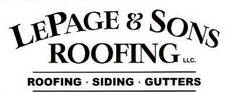Humidity is present almost everywhere, including inside your attic. That isn’t a problem if your roof has adequate ventilation installed. However, if moisture accumulation happens frequently due to a lack of vents, mold and mildew could thrive in your attic and compromise your roofing system.

So, how does excess humidity affect your roof? Expert solar roof company LePage and Sons Roofing LLC explains below.
Where Humidity Comes From
Humidity refers to the amount of water vapor that’s present in the air. Daily activities like washing dishes, taking hot showers and doing laundry can cause moisture levels to rise. If not managed properly, high humidity can make your living space feel stuffy and uncomfortable. It can also cause deterioration and rot to some of your home’s wooden components, ranging from furniture and other fixtures to the exposed wooden parts of your attic and inner roofing structure.
How Does It Affect Your Roof?
It can lead to rot, mold, mildew, water leaks and other kinds of damage. If not fixed right away, it can accelerate the deterioration of your roof’s framing components, such as the rafters, joists and support beams. This requires urgent attention from an experienced roofing company.
How to Protect Your Roof Against Excess Humidity
Improving your roof’s ventilation is one of the best ways to protect your roof against the damaging effects of humidity. Proper air circulation in your attic helps minimize mold growth and water damage to your roof. Routine inspections also keep humidity problems from getting worse. Consider investing in a dehumidifier to reduce moisture in your indoor living spaces.
Your online search for “roofer near me” stops with LePage and Sons Roofing LLC. Our team is committed to delivering high-quality craftsmanship and personable service. Call us today at (508) 295-6483 or fill out our online contact form to request a free estimate.
